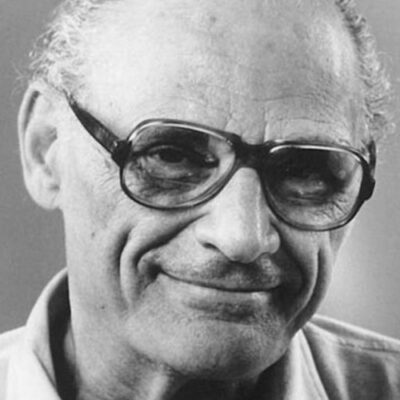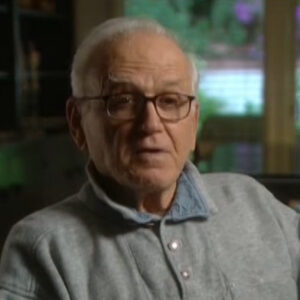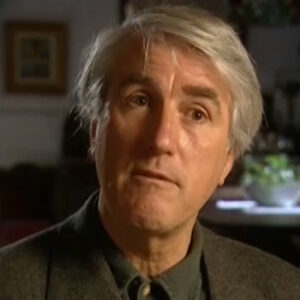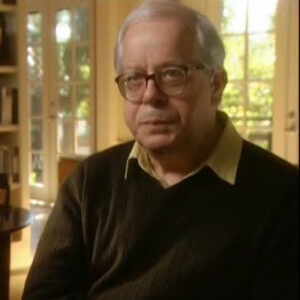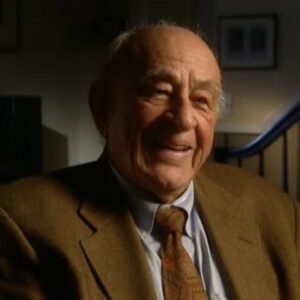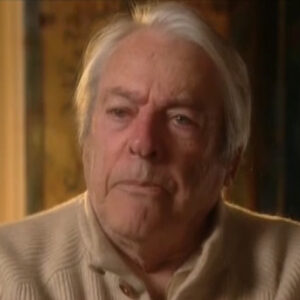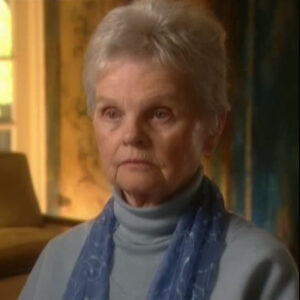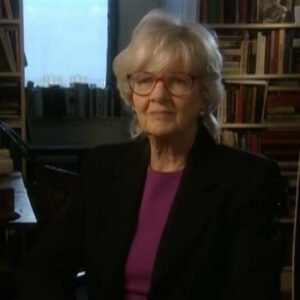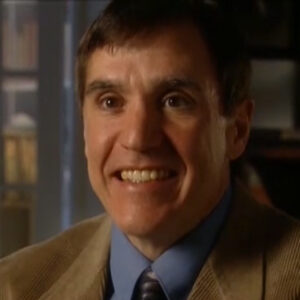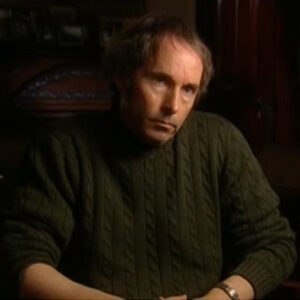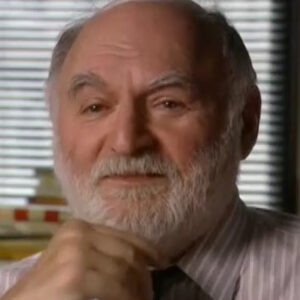Speaker I want to ask you, it may seem silly, but do you think about the blacklist anymore? Do you think about the McCarthy era much? I mean, is it. So this president or is it more like a book once Brian sits on your shelf that is collecting dust?
Speaker Now, the blacklist is always there. That period is always there. And it comes and goes times. And I don’t think of it, but it was so much a part of my life, you know? And particularly now when unfortunately, no, the people whom I knew then are no longer with us. And those bring up memories. So I do think about it a lot easier just because it took up a big chunk of time. Well, not just time. I mean, it it affected me profoundly. It affected my life profoundly. And so in so many ways, the most obvious way was in terms of career. You know, I didn’t stop.
Speaker But I guess you are the wounds still there or any way or, you know, the wounds?
Speaker No, I don’t think the wounds are there, actually. When I look back on it, I often look back on it. If I can use the word happily, you know it. It showed me wonderful things about people.
Speaker It.
Speaker Brought out things in myself that I didn’t know was there. Feelings of generosity and friendship, warmth.
Speaker It taught me the value of those things, you know? And so when I look back on it, it’s not just in terms of, oh, what a horrible, awful experience. There was a lot about it that I miss, actually, in terms of the solidarity, in terms of the commonality, in terms of the the help people gave each other support. I miss that. Interesting.
Speaker Yeah, I expect it. OK. The need to read you one these.
Speaker So that I think that made a big difference.
Speaker So let’s shift to one of our main targets. How did you come to me?
Speaker Because I met Kazaam through Mardie Red Hachey. Rick was a friend of mine. And we’d met after the war. And he knew that Kisan was looking for a writer to write a play. For him, it was a bad.
Speaker It was actually very loosely based on a man who had been a theatrical producer at the time. Man Joe Kipnis. And in a previous incarnation, had been a gangster in the 30s. And Kazan had an idea that there might be a play there in that character for an actor like John Garfield. I think is one he had in mind. So Marty introduced me to Gadge, and that’s how I met him.
Speaker You know, as we were talked about earlier. Yeah. Because then first of all, why with where?
Speaker I think it came from the time when he was first starting in the group theater when he was very young and he was a kind of a handy man who did a lot of things. I think it came from gadget that he was always fixing gadgets and doing gadgets. That’s the story I heard anyway.
Speaker And he’s an old man now. No person he was when you met him. How we see the person you remember in your mind’s eye. Was he also quiet, reserved?
Speaker Well, was never. There’s not a word. He was full of energy. I don’t mean he was. You know, all over the place particularly, but you get the sense of a great deal of energy. And he had enormous charm with the most seductive man I had ever met. Really? And he made you feel that he was interested in you, that he saw, you know, and approved? I think it’s one of the things that made him as good a director as he was in terms of reaching actors and getting performances out of them.
Speaker He was smart, but he connected, I guess, in a unique way.
Speaker Yeah. Well, he connected with it with anybody. That’s what I, I was thinking of. I think when I talk about his seductiveness, I mean, he he really made you feel he was interested in you, you know, and. And I was you know, I was a kid. I was you know, I hadn’t done anything really. And I he made me feel good. And you were trying to write for him? Yes, I was trying to write this play. And.
Speaker He can pay me anything to do it, but he you know, I felt it a great honor. Why? Because of who he was. First of all, his here because, you know, you’re walking free.
Speaker Now, your reality is that this is a jail. You know, I’m happy to do it, but I don’t think you’re. Well, thank you. Because this is one that’s life.
Speaker You know, you’re Walter Bernstein. You’re a famous writer. You’re young when you get to meet Dad for the first time.
Speaker Why is it an order? Why is it something special or is it not? It’s just a run of the mill job.
Speaker Well, no, it was I never felt it was a run of the mill job because I felt he was, first of all, a prominent director and important director at the time. And also, I felt he was a progressive man. He was. We were on the same side politically. And that meant something to me at that at that time who want to do the same kind of material. He came out of the group theater, which had been an enormous influence on me when I was a kid, for starting to go to the theater and seeing plays like a Wake and Sing and Paradise Lost and Gentle People. And those Odette’s displays, they were meant a great deal to me and he was part of that.
Speaker And also Marty, who was a close friend, revered him as well. Marty Ritt revered him and he’d been very helpful. He’d gotten Marty really into the theater. And so it meant a great deal to me to be able to write a play for him.
Speaker You know, everybody talks about Miller talks about laughing and talk about how important the group theater was to their own desire to become a writer to come into the theater. What is it about the group theater that attracted you, Paul? What is it that it is?
Speaker Well, I just remember I think I was 15 at the time and I would go to the theater. I lived in Brooklyn. I would go to the theater as often as I could because for fifty five cents you could get it to try to get the first row, the second balcony. And. And I remember going and I didn’t know anything about the group theater, who they were. And I just saw anything I could and I went to see awake and sing and it just the, the language that kind of poetic New York Jewish, you know, language. I thought I felt how does this man know my family? You know, he was writing about things that I know in a in a kind of a cadence and, you know, kind of a speech plus the acting, which was quite literally, you know, group acting. It was ensemble acting of a kind I’d never seen before. And. And what to what they were saying, really, you know, the kind of progressive populist Marxist attack on material always very important to people like myself, I think, you know, and. You know, the other kind of theater, which I just love going to the theater and I like just about anything but. But this was a very visceral kind of feeling, a part that, you know, you mentioned it briefly.
Speaker I wanted to just make sure we don’t lose sight of this. Is that, you know, how not just yourself, but how it is. People are people looking at present. Fifty fifty one. Even early. Fifty two. Is he seen as somebody who is reactionary? Is he seeing somebody leave with McCarthy and Reagan as he is.
Speaker Is he seemed like that now? No, not really. In the early 50s, late 40s, early 50s, you know your group. How do you perceive it before he gets called to testify? Before he gets called to testify? I, I, you know, I can’t speak for four other people, but I always felt that we were on the same side. He was a left wing progressive fellow. He was operating in the mainstream Broadway, Hollywood.
Speaker But.
Speaker As a matter of fact, I mentioned this in the book. I remember him asking me. He knew that I knew a. The vice president of the National Maritime Union, many Blackie Myers, who is, I think, a fairly open communist at that time, and he wanted me to. For whatever reason, I know that he had the idea of a waterfront story at that time.
Speaker A long, short story. And I arranged a meeting I call Blackie, and he brought a couple of his friends from the union. And I came down with Gadg in some bar on the lower west side on the waterfront.
Speaker And we spent an afternoon talking about anything, talking about politics. I’ve met a lot of stuff. And when we left Gadg and I, we walked on the street and he turned to me, said, those are the people I belong with. Those are my people. That’s and a month later, he testified. So but at that time, I.
Speaker Do you say said those are the people I belong with, these type of longshoremen?
Speaker No, he’s not. Talk about long term. Our people on the left. He’s talking about militant unionists. He’s talking about communists.
Speaker He’s talking about the whole the whole shtick. The whole left, you know. That was the side he was on. According to the whole left wing conspiracy. That’s right. Yeah. Yeah.
Speaker OK. Before we get to the testimony and all that other stuff, how you all feeling about this? You know, you talk about him as the most seductive man. Is he attractive and you think he sees himself? What your experience was as a beautiful, dapper guy?
Speaker No, I don’t think so. I think Gadge was who was always very defensive about how he looked. What? You know, he.
Speaker I remember one time I was down visiting him on the set of panic in the streets in New Orleans. And. We’re staying in the same place and he was primping before a mirror to go out on a date, had a date with I don’t know whether it was an actress or some young woman from New Orleans, but I’ve put up with some.
Speaker You know, some some young woman of no particular certainly no professional importance, and she was not a beautiful woman. She was not. She was a kid, essentially, and he was very nervous about how he looked. And I remember Zero Mostel, who is in the Senate, kidding him back. What was he doing? Well, you know, he was.
Speaker But he, I think.
Speaker Part of the promiscuous ness or the Flender anger affected that he indulged, too, his life was kind to show how he really was, you know, attractive. And he was. He was. It was enormously attractive.
Speaker He didn’t seem to be sort of denying himself much. That I don’t know. I don’t know what you mean exactly by the advocates for women involved. There was nothing that really held him back.
Speaker No, no. But, you know, he was in a position of power also then.
Speaker But he was. And he he always kind of felt there was some kind of chip on his shoulder all the time. He always felt a little. I think the one down in some respects, either because of his looks that he thought of himself. There was a thing Marty Rick told me about he and Kazan standing on a street corner and two attractive women were across the street.
Speaker Let’s stop for a sec. It’s silly. Can you talk to me about your trip to Dalby’s and what you did?
Speaker Well, I went down to visit. Gaddafi was shooting panic in the streets and down to New Orleans.
Speaker I went down to talk to him about the play. He had invited me down and I think I was staying in the same house.
Speaker I’m not quite sure that. I just know one evening we were in the same house. Zero Mostel and he and I and he was primping before a mirror. I’ve been very self-conscious about how he looked and want to look good because he was going out on this date with this. This young woman I know she was an extra on a movie or or who she was, but she was this kid and not particularly beautiful or attractive or anything. That deputy who is going on this date and he was this big time director, you know, being, you know, worried about how he looked. And I think he was always conscious about that or self-conscious about the way he looked through traffic heading for you.
Speaker But not too much. Not too much. I mean, he be it took it a little bit, you know, but I don’t think he was very happy about it, really.
Speaker You know, you talk, I think, quite safely. Can you read it in his book a little bit, too? Not only a sense that he was physically uncomfortable, but I think that that sense of being you’re having the crew, you know, is even there in college when he goes to Williams, it seems to me that he always feels.
Speaker This tension with a kind of a week.
Speaker I think so. That’s why I mean, know, I think he felt always a little one down. You know, he came from a middle class family. He was not, you know, impoverished, was not an impoverished youth.
Speaker I know what it was emotionally, but he was defensive. There was something defensive there, although with me, you know, it never was. He was just very nice to me, always, you know, and helpful. I would go up a couple of times to his house in Connecticut was in Massachusetts, and we would talk about the play and I would tell him what I was doing. And I hadn’t gotten to the point of showing him anything. I think I’d written about an act and a half. But then what happened? Well, what happened was that he testified and name names was a cooperative witness and that was the end of the relationship.
Speaker Did other people, when kisan name names that you knew that you were friends with? Was it in keeping with what how they felt about him? Did it surprise anybody?
Speaker Well, sure surprised me. And it. It’s surprised and stupefied. Marty, you know, who was just for a while didn’t know how to deal, you know, how to deal with it because consignment so much more to him than he had to me. Other people would not liked him. You know, it it became very personal. What what you felt about him as it did and in most cases was how you felt about the person testifying. I mean, the the emotional weight of what you felt. I mean, you may disagree, you know, but the emotional affect was different according to what you felt about that person.
Speaker And I guess, you know, trying to Dennis, the tenor of the times, you know, was were people angry?
Speaker Oh, I think they were angry. They were disappointed. They felt also that. Whereas other people might have stood up to the committee and lost their jobs and been able to work and have kisan and refuse to give names, it used to be cooperative. He still would’ve worked. He would’ve worked on Broadway. There wasn’t a blacklist. He could have gone to Europe to do films, to do theater that it was not.
Speaker You know, that that his in some way, his testifying, being a friendly witness seemed worse because of that. I mean that, whereas you might make some excuses or understand where somebody would totally lose their livelihood unless they testified and therefore it became a friendly witness. It’s hard to believe that. Impossible to believe that about Kisan, which made it worse in many people’s eyes. Was it?
Speaker Twenty minutes. OK, let’s change. I want to keep going on that thought.
Speaker Which a couple of questions that I had thought you before, because I was just about when you all kind of sense that things were changing and this dark cloud was descending over at least Hollywood and television and then know just personal questions, often as dumb as the questions. But there are no dumb questions. Just dumb answers. Very true. But let’s get back to this question, because ends up being a friendly witness.
Speaker Do you think the there is a phrase of a greater sense of what’s in Kisan having been friendly naming names? A sense that the committee’s gotten a little bit more.
Speaker Juice from this guy? Well, yeah. I mean, Kazam was a, you know, a big feather in the cap. He was he was that important because. What the committee was after wasn’t the names that they wanted you to give. They had all the names they didn’t need. They had all the names they needed. They wanted your name. That was what was important. They wanted to be able to say, we have Alia Kazan on our side. You know, he’s collaborating with us. Really? That was what was important to them, that it didn’t matter if they really. If they got. Schmuck. You know, this small time actor who had been a communist, that we gave them half a dozen names that didn’t mean anything to them particularly, but to get Kazan, that was very important to them. And because of his prominence, because somebody like that, particularly someone who’d been associated, you know, so strongly with the left, you know, to come over to them was what they wanted. That’s why it was it was important to get somebody like Esan.
Speaker Your question I have also looking back now, 50 years after the words. Do you have any sympathy for what Kizzire went through or what they did? They’re two different things.
Speaker No, I don’t have any sympathy for him, you know. I find myself with residual feelings of fondness for what that time was with him.
Speaker And but I have no sympathy for him. He hurt people, he hurt other artists. You know, he had the as I felt the friend friendly witnesses did he hurt the country.
Speaker And then he went on to with his career and and his and his life, you know, untouched, presumably by any of this. And so, no, I don’t have any sympathy either for what he did. You know? You know, he’s old now and he’s ailing and I feel for him.
Speaker Yeah. No. You know, I guess what I was getting at, you know, is that in 52, when he’s called to testify, he’s being asked in effect.
Speaker And so he’s broken with the party as many, many people. Yeah. Yeah. And he’s being asked to defend a piece of yourself that’s no longer true to who he is. He’s being asked to choose. Is he even free between two awful places?
Speaker You see, I think that the choice that he made, the two places, I think he made a choice between Arthur Miller and Spiro Schaus, who is the head of 20th Century Fox at the time. That’s the choice he made, whether to go with someone like Arthur, what Arthur represented. I don’t mean specifically Arthur himself, you know, or to go with the power which Scorse represented, this very powerful Greek who is the head of 20th, 20th Century Fox, that that’s the choice he made, essentially. And. Good luck. Well, it was more than money, I think was it was being accepted and being part of the palace structure. I think that ultimately was very, very important to him, just as the wife he had at that time. Molly. Molly de Thatcher was very important to him. Whatever. I have no confidence in knowing what what information about what their life together was like or what the basis of it was. It was important to him that she was this WASP lady. You know, this is part I think of of the one down is that he felt it wasn’t just the money.
Speaker I didn’t think it was just the money or the, you know, the need to work in Hollywood particularly. I think there was a more profound choice operating there for for Gadge that that went along with the feeling that we talked about before where there was inferiority or feeling. Funny looking Greek times.
Speaker And, you know, even the kind of person I would like Mayor and Warner, I mean, the immigrant sense of wanting to be American.
Speaker Yeah.
Speaker And feeling like the bad that you have to wear is even more American.
Speaker You know, let’s let’s just shift back a couple years.
Speaker What was what sense do you get that there was this dark cloud that we now call McCarthyism, certainly 47. Everything was still in Wisconsin. But when was your first time that there was?
Speaker Well, I was I had gone to Hollywood for the first time to work in 1947 and.
Speaker I was there when the Hollywood Ten originally was the Hollywood 19, I believe. And then they think because the director producer I was working for, Robert Rossen, had been picked. I think as one of the 19 and then one was cut down to 10, he felt very chagrined. He didn’t make the cut. And so I knew something something was happening, obviously.
Speaker But let’s go back to that moment. How the committee comes out to Hollywood in 40 said.
Speaker They’d been there before. You know, before the war. I think it was the Tenny Committee or something like that. No, there was a state committee. Yeah, well, so is it also. Yeah. Oh yeah. Yeah. They’ve been. Yeah.
Speaker What’s what’s the feeling when the committee comes out in 40 seconds that these that this is the end of the world, that it’s all going to fall apart now?
Speaker Oh, no, no. Nobody felt that. I mean, everybody was still riding on the acceptance of the left in Hollywood during the war. And, you know, everybody was everybody was working. Everybody was. We felt this was the lunatic. Right. You know, that was coming afterward. And but there was no sense that they were going to win necessarily. It didn’t seem to make much sense to me anyway that they would they would make trouble for people. But I didn’t foresee at all, you know, what was going to happen. But it was a cloud. Obviously, it was a cloud.
Speaker It was going to be you know, there was going to be trouble.
Speaker What was the first sense that there was going to be trouble? What was the first sense that, you know, you guys happened? Oh, my God.
Speaker Well, I think with the committee coming, I think was the calling of the ten, you know, essentially that there was there was going to be going to be trouble. But we still felt I wasn’t part of that community. That Hollywood community had come out from New York. I knew I was going back to New York and I hadn’t been there before. So my sense of that community was was very limited.
Speaker But you get a sense that people were nervous, that they were dividing lines to the forum.
Speaker Well, the the dividing lines, again, was between what I felt in my ignorance or naivety was the the Hollywood community of liberals or. And, you know. The hard right. I mean, the word bonds or the John Waynes or the aid of, you know, a nut like Adolf Monju. But I thought anyway that this was the you know, this was so extreme. They were so extreme that they weren’t going to prevail. It made no sense to me that they would. And when they did, when they did, it was you know, you then went for me anyway.
Speaker The sense of foreboding came that this was not just going to be some aberration. That was happening, that the abberation actually was the that the period of cooperation with the Soviet Union or with the left in America. You know, that was the aberration. And we were coming back much more to a period of political normalcy in this country, which was that the marginalization and the demonization of the left.
Speaker Yeah. You know, going back.
Speaker How did you and your friends, you came off? Yes. How did you you friends like Marty read other people that were in your type circle? How did you come to find out? There was a blacklist.
Speaker Well, by that time I was back in New York. I was starting to work in television, which is live television at the time. And. This booklet was published called Red Channels. Which was a compilation of names about how many hundred fifty hundred seventy names of people, Neots tainment, business actors, writers, directors, musicians. And with a listing of their. Communist or progressive affiliations. And had been put out by a couple of ex FBI agents who also ran a organization I think called Aware, which was a screening of communist fellow travelers in the entertainment business, and they put it out and.
Speaker If you were in red channels, you were automatically blacklisted and I was in there about eight listings. I think for me, supporting Russian war relief, supporting the Spanish loyalists in Spain, civil rights, Congress, writing for the new masses, which was a communist magazine, things like that. I came right after Lenny Burnstein heard that and they were all true. Everything they had about me was perfectly true. And it came out. I didn’t pay much attention to it when it when it came out. I think I probably would have felt a little insulted if I hadn’t been in it. But the first time I knew about it, I an agent that I had at the William Morris office came to me and said.
Speaker With a job offer to write a half hour audition script to pilot script, what they call deferred advertising agencies, did the shows then at that time and I wrote it and when I got reset, put another name on it, I said, Why? But he said, well, you know, your name is on some kind of list. And they know about, you know, just do it, you know. And so I did it and I got paid and and forgot about it pretty much. And then he called he called me and said, the producer at the Advertising Age, he likes the script but wants to see the writer. Has some notes, Warren. And I said, I can’t go up as this other guy.
Speaker People know me at that advertising agent. He said, well, you got to go. The guy’s got a right to. You know, two days to see his rider, he’s paid for the script. I say I can’t do it. I won’t do it. So he got mad at me and hung up. And then he called the web. He said, I fixed it. I said, What do you do? He said, I took this rider off the script. I said, he’s being uncooperative. And I got him another rider to do the changes. I said, fine. Who’d you get? He said, You see what you mean? He said, I got Walter Bernstein to do it. I said, Well, why couldn’t you done in the first place? He said, no, mine just do it. So I went up and they listened to the producer tell me, you know, what the other rider was.
Speaker And he would never hire him again. And he gave me the notes and I made them and they were fine. And he said he didn’t know why he hadn’t got me in the first place. I was a much better writer than the other guy anyway. And that was my first hint that maybe something was happening. And then the next voice, you notice you could not work. You were. That was came. Came.
Speaker This is not. Sir, do you want some water? You know that being in red. He’s going to call you your livelihood.
Speaker I was writing for a half hour CBS show called Danger that was being directed by Sidney Lumet and produced by a man named Charles Russell. And I came in one day. Prescript conference or whatever. And Russell said. I am told that I can’t use you anymore. I’m not supposed to tell you that, or rather I’m supposed to tell you I can’t use you anymore, but I’m not supposed to tell you the reason I said, what’s the reason you said you’re on some kind of list. I don’t know what it is, but they said I’m just to tell you that we’re going in another direction with writers. But changing for whatever gave you some kind of reason. And Russell was taking his career in his hands. If he had told me this and that was the first time I knew.
Speaker Why? You know, why do they never admit to the fact that I was a boy?
Speaker Oh, no. Never. Never were never admitted there was a blacklist because they could be sued. Then it was always some other reason. So did you have any sense how you could resurrect your career? Yeah, I know that that was really I could do one of several things. I could go to the un-American committee, become a friendly witness, or I could go to one of the networks had executives who dealt with this kind of thing. I forget what they were called and what the title was. There was a guy named QEI or O’Shay or think was his name at CBS.
Speaker You could go to him and confess essentially, and do a mea culpa and say well and say this may be true. I don’t believe it anymore. I’m against them. This is. But in which case you would be asked to name names. That was always the the basic thing, whatever else you said. Or you could have gone to one of the newspaper columnists. There was a columnist for The World Telegram named Frederic Woltman, I believe. So another Hearst columnist named George Sokolsky. And you could go to them. And if they said you were OK, you could work. But it was always it wasn’t only ever a case of saying you’re sorry and you won’t do it again and you hate them.
Speaker And it was always came down to the proof of your willingness to be a good guy was giving names.
Speaker You know, one of the things about before we get out, I want to talk about the racket.
Speaker It’s nice to see it. It is a Ragnarsson protection racket. Soccer, along with it, are protected because they would name you.
Speaker And then for a fee, they would clear, you know, you could go to a where they put out an maxin, also called counterattack, I believe, and pay them a fee. And your lawyer would go to them or whatever. And after having named you already, they would clear you. Not sense. I felt it was a, you know, different mouth, Kapone.
Speaker And, you know, some of the characters are totally bizarre. Is it true that there was a guy from Syracuse? You make mention of him just briefly. There was a grocer in Syracuse. Quite a bit of an overlap. Yeah, there was a grocer in Syracuse named Johnson.
Speaker And I think three stores, three supermarkets and markets of some kind. He was a rabid anti-communist and he would follow the shows and where he I don’t know where he got his information, but if he felt that, say. The sponsor, Borden’s Milk, was hiring, but he felt what communists? He would put a sign up on the shelf with Borden’s milk, was saying, if you want your money to go to support communism whenever. And however, I don’t know how in my case of danger to CBS or in Syria.
Speaker Yes. As I was once one store, three stores, whatever was in Syracuse, but CBS was sending him Cassilis to approve.
Speaker And I remember Charlie Russell telling me that there was an actor he had cast in one of the danger shows John Randolph. I believe it was at that Johnson objected to and. Came down himself. And the executive CBS met with him and they just, you know, cowered before him and gave it to him.
Speaker Something to you? It was extreme. There was no enemy back.
Speaker No, they were. They were. Well, what were they so afraid of? Well, the net then what the networks were afraid of always was government regulation.
Speaker That’s what they were scared of, that if they bucked the government, i.e. if they were showed themselves to be anything, could be construed as pro communist or even liberal that the government cracked down on the FCC or something would crack down on.
Speaker And so, you know, they were given the airwaves for free. You know what, Bob? They had a lot right with the studios. They were scared that. Again, the theaters would be picketed. I mean, there was one case of, you know, what movie it was. I think was something with Freddie March, who was not a communist. It was a liberal guy in which the projectionists were going to go out on strike. If that movie was shown, that’s what they were scared of. The American Legion would picket.
Speaker I want to inscription number twenty three American Masters, None Without Sin, January 15th of 2002. Videotape twenty three is about good, huh? OK. OK, good.
Speaker A continual attack. Well, it was hard to imagine how magnetic Kisan was both as a person and also as an actor. I don’t know whether he was a great actor or not, but when he came on the stage, I remember him and Golden Boy, we played this gangster Eddie few Sally.
Speaker And he played it very still. And but you didn’t take your eyes off him. I remember him and he did another Odette’s play. Not a successful on cold night music in which he played this kid who is a kaleidoscopic kind of play. And he just found you. You just looked at him. He was in an urban show, a play called Gentle People. He had a small part in it. And then, of course, he was, you know, in waiting for Lefty when when he commits that strike, you know, and then there was a magnetism about him.
Speaker And again, I stopped when he walked off the stage.
Speaker No, it didn’t stop it, you know, took another form. You know, he was never flamboyant, you know, are extreme, but it was always there, always that he was a magnetic personality and. But it was it was combined with a what you felt was a genuine warmth, you know, and it can concern for, you know, for people.
Speaker I think our member, Karl Malden, you know, Bertram a lot talking about how Gadg would take the actors out to dinner, you know, with the women who would also seduce them and but, you know, and take them to dinner. So.
Speaker OK, OK.
Speaker Did you ever get a contract? We find out from CBS that you can right like a government ever contract?
Speaker Well, the FBI starts coming around and they would once a month or something like that, they would knock on my door, always two guys and very polite. And they’d introduce themselves and they’d say, we’d like to talk to you. And I would say, I’m sorry. I got nothing to say. And they would go away and usually they would come to the house. But sometimes they would get me when I was coming out of the house. They would get me coming off a bus. Once they stopped me on a subway platform. And I think the reason for that was just to let they were very polite, never threatening. You know, I’d say, I’m sorry, I don’t want to talk to you, and they’d leave. But it was kind of scary because they were saying, we know where you are. You know, we can get you in and get any time. And I lived in a brownstone with about four apartments in it. And the superintendent was a young man and he would tell me that.
Speaker It’s just a New York truck that’s just a truck. OK, so super.
Speaker And then he would say the EPA came around. They wanted to know who visited you, what you were reading, but what you threw out. What magazines? Things like that, you know. And that that went on.
Speaker Two questions. First is that it wasn’t on uncertain time. If your father. Husband, you’re married.
Speaker I was married for most of that time. And he’s having FBI agents. It’s not fun. It’s not fun. I mean, I get it. However, you know, you may feel about it. It is unsettling because of that. I think if they kept coming to the house, it wouldn’t have been so bad. You get used to that, you know, and it was the stopping. You would other places which had the effect. I think the intended effect, which was to make you nervous and to make you feel threatened and anything to break you down.
Speaker Anything that is I heard that story yesterday when I read your book that strikes you just 50 years after the fact so I can feel that comfortably is how absurd it is that the government is spending this much money, resources, time and energy.
Speaker I mean this in any dismissive way on you. I mean, you just.
Speaker Well, you don’t exactly feel flattered that they do. They’re doing that. But, of course, it’s stupid. It’s an enormous waste of resources. You know, but like, once that machine gets rolling, now it stops in, a bureaucracy gets created and that’s got to be fed that it’s got to work. You know, their rationale, I’m sure, is that one thing can lead to something else, can lead to something, you know, important. The whole thing was ridiculous.
Speaker I mean, it does beg the question of was there something to worry about in terms of the Communist Party, maybe not in terms of Walter Bernstein or other writers or actors, but was at the core. There are real.
Speaker Well, I think I think probably that there were probably there were members of the Communist Party who spied for the Soviet Union. I’m sure that was that.
Speaker That was true. There was a.
Speaker You know, it was him. It was a movement that had sympathizers in all countries. Lots of lots of countries. And so I’m sure that was, you know, how many, you know. You know, I don’t know. I think that that was. That was true. I never saw anything like that. I mean, my part of the Communist Party, the Communist Party, I belong to the cultural section, you know.
Speaker You know, we we can’t we didn’t have access to anything that anybody would be interested in, particularly, you know, and we get with union matters. You know, we dealt with you know, we followed the foreign policy of the Soviet Union.
Speaker How did it get to that? Because before I lose the FBI guys, you know, one of the. Things that make today so callous or even stupid is that.
Speaker People get laid off all the time. People lose their job.
Speaker Industries downsize. Divisions get eliminated. So he gets blacklisted. That can’t be a writer, can’t be an actor. Why can’t you find work somewhere else?
Speaker You try to find work somewhere else. I don’t think that’s the that’s, you know. I think that’s the issue. One of the things with the blacklist of people is that it didn’t end often just with their being blacklisted. They were in some cases, you know, pursued. I I knew someone who got a job as a. Cashier at a job at a meat market wholesale meat market after he’d been blacklisted and the FBI came around and told his boss. Did he know that he was hiring a communist? No. And the guy Farnam. No, gave me a package of lamb chops to take home. But fired him. So it didn’t just end. There just wasn’t. Once you were blacklisted, fine, go get another job and your life is to be different. But you know, you’re not going to be persecuted anymore. That’s true.
Speaker Why should the government give a damn about whether or not the guy is cutting steaks or weighing a chicken for some?
Speaker Well, you know, because if it’s if it’s a witch hunt and you’re looking for witches, which is could be anywhere, you know, and who knows if this guy was not creating a coven there in this meat market, you know? And once you believe that, then, you know, it doesn’t end anywhere.
Speaker To ask you how you thought, what you felt when you heard that, because I had a couple of years ago was being honored with the Lifetime Achievement Award. What was your first response?
Speaker My first response was.
Speaker No, no, don’t give it you don’t give it to him. You know?
Speaker That part of his lifetime achievement was being this friendly witness and hurting this industry that’s now preparing to honor him. He’s been honored for his specific works. He got an Oscar. You know, he’s. You know, if you if you want to say, OK, you know, here is this movie, we gave an Oscar for it. He did this work fine. That’s one thing. But to say we are honoring him for the achievement in this movie industry, his you know, his achievement, you know, was to in my opinion anyway, to dishonor himself and the union and the union and the industry. And it would be wrong to give him an award for that.
Speaker That was my feeling. Bar enormous said to me, you know, that he felt she felt his. During his lifetime, his legacy was the destruction of lives.
Speaker I don’t think that’s I think that’s not all of us. All of what his legacy was. You know, his. He was a wonderful director. He was a rather unique director and at a particular time. And. I recently read a book of interviews with him. Were done in the 70s, Jeff Young’s book. It’s one, you know. It’s a very good book. I mean, that the stuff that he has to say about directing and about the things is, you know.
Speaker Case beyond the intellectual. The sense of it was right or wrong to give him the Oscar.
Speaker Sort of what that feeling. Did you have what was that initial response?
Speaker Was it the initial response was.
Speaker Like, my responses to these are is visceral. You know, it’s a.
Speaker You know, that that it it did open up something, you know, in me of feeling that this man.
Speaker You know, in my opinion, again, betrayed himself, he betrayed mighty red. Betrayed me. He betrayed Arthur Miller. He you know that he was essentially a betrayer. And that’s not an intellectual response. That’s an emotional response. And.
Speaker And I felt that, you know, this is coming up again. Who needs it? Exactly.
Speaker You know, people like me knocking on your door. Can I play devil’s advocate for a sec? Sure. Yeah, yeah, yeah. Like an intellectual question about and the Oscar. And somebody says, well, look, you know, whatever you do, the community is what he did before that.
Speaker This is a word for the work that he created. And certainly you are hard pressed to find terms of directing. Somebody who has had his generation has more profound an impact as he had the the politics that the actions before the committee are irrelevant.
Speaker I don’t see. I don’t believe, really, that the actions before the committee is separable from the work. I don’t believe that. I believe when you get a lifetime achievement award, you’re getting. You know, an award. Also, for you as a person, I’m sorry, I feel that I don’t. If somebody was saying we’re going to as I said before, we’re going to give you the Oscar for your gentlemen’s agreement. Something like that. Fine. OK. But the other, the Lifetime Achievement Award to me anyway, anyway, is different. It’s the award. You give me this award to this man and you’re giving it to him for representing this industry, this movie industry, you know, and that can’t be divorced from what he did before the committee. To me, I believe that.
Speaker Not to put words about, so please tell me I’m wrong. But it sounds to some of what you’re saying is also. That by giving him this award, it is putting his stamp of approval also on.
Speaker Well, yes, I did. I think that’s inherent in giving the award. Is it saying that what he does you approve of what he did, what he did in testifying before the committee. That when you say it’s irrelevant, really, you are in a sense, I think a relevance is is. Again, equal to approval. You’re saying it doesn’t matter, really doesn’t matter what he did and it did matter. It did matter a great deal and still should matter.
Speaker Do you think there’s a part of me that when I tell you his. But I think about it in milk. I’m struck by.
Speaker How they can’t escape the 50s and how many people are not stuck there? That’s not one point. But what happened? Still defines. So much of who they are. Do you find that that’s true with Coors or Miller?
Speaker Because in particular, you know, I don’t know about Arthur. Well, it does with you defined by your actions, you know, by you know, he acted in a particular way at a particular time. You know, he made it even he made those two. He made those choices. And they were enormously important. And and that that period was so important. It was a shameful period.
Speaker It was a period that hurt this country enormously. I think it’s it’s a period that still. Hangs over now, the whole question of descent, how you deal with dissent, how this country punishes dissent is extremely relevant today. No particular. A couple of months ago, I went out to the University of Oklahoma to show the front and to speak just two classes, there are some classes there on the blacklist that period and. Spoke to a lot of, you know, classes of 200, 300 and Shodan showed in the movie. And this was Oklahoma. Mostly the students from the state and. They were by no means dumb or, you know, they were ignorant of the period of that whole period, but they dug the movie, which was interesting to me. They went along with it. They laughed. They cheered at the end when Woody defies the committee. And I was very struck by that. And I didn’t know how much of that related to September 11th. But what was going on in this in this country now? The questions they asked afterward, you know, in the Q&A that we had afterwards was a lot of. Do you think it can happen again this period? So I think in that sense, the 50s is still with us and. You know, regardless of how we may feel personally, subjectively about it, because it seems to me I’m sorry.
Speaker Do you think that you think that the 50s overshadows?
Speaker His career. And if it does, do you think that’s fair or is it tragic? Is it right?
Speaker I know it’s it’s hard to say I’m trying to remember the movies he did before in the movies he did afterward.
Speaker Once again, Streetcar Named Desire. Very nice. And then there’s afterwards. Yeah. Steinback stuff there. And he was a part of this. You know, I never I guess you know what people think about because know, is he ever going to be separated from the committee? Is that fair? Is that right? Two question. Yeah, yeah. Is he going to ever be separate from what he did?
Speaker And I think the movies can be looked at separately. Sure. I think you can. You don’t have to say, oh, boy, look how rotten the movies were afterward and how great they were before. You know, I think, you know, he’s gonna be judged. The work is gonna be judged as the work and and should be. I mean, you look you can look at the vibe as a partner and see John Steinbeck’s anticommunism in it, you know, for example. And but judge it on that basis. Don’t judge it on the basis of, oh, you know, look, this is I think you can you can take a movie that he did immediately after that one, that terrible movie with Freddy March and the Circus and check us. A lot of men are tightrope, which is, in my opinion, terrible movie, you know, and a movie he did in order to show his anti-communist credentials. You know, particularly you can say was movies piece.
Speaker And this is one of the reasons it is. So he never really believed in it. He never, you know.
Speaker You know, the other movies, you know, East of Eden, what he judged by its Splendour in the Grass and the best rock.
Speaker Last question.
Speaker I think you ask yourself in your book, or at least you struggle with it in your book. Were you for all of the important and thorough questioning that you were doing about UAC and about dissent in this country, about democracy by human rights at the same time? Are you asking the same tough questions of communism? The Communist Party from the Soviet Union?
Speaker No, no.
Speaker I wish I had. When I look back on it. But no, of a number of reasons. I guess.
Speaker For me, the Soviet Union was still.
Speaker The. I don’t know what you want to call it. The standard bearer, the theme for what I believed in. You know, I didn’t I didn’t want to, for whatever reasons, examined too closely what was happening internally in the Soviet Union. I felt the Soviet Union had basically won the war, that the Red Army had won the war that the Soviet Union was a supporter of. Libertarian national liberation causes around the world and. When I did hear things about the trials, for example.
Speaker I rationalized it or either by saying, well, it’s the Bush white press reporting it, you can’t believe them or else that, yes, there were spies. The Soviet Union had been attacked since its inception, had to defend itself. I think the post-war trials bothered me. The trials in Czechoslovakia and Hungary mean that. They didn’t make any sense, particularly to me, that these people who had been or rather I seemed to know more about them than I did about the trials. Thirty eight or thirty nine. When I was much younger, but I didn’t really question part of it, I think, was that we felt we had circled the wagons, really. And and we were defensive about. What we believed in, we felt we had to protect it because the people who were disagreeing with us were the people who were also attacking us.
Speaker Fair to say that, you know, you couldn’t go through that self critical examination about party membership because.
Speaker You couldn’t let doubt creep in, it was part of it, I think.
Speaker I think so, yeah. I think that we had to present a united front. It was, you know, hard enough to survive without going through a period of questioning that I think unconsciously any any way we felt would open up big fissures that big, you know, and I guess break our resolve in giving yourself critical self-examination of Communist Party, of this nature of Stalinism.
Speaker Did you feel that that was giving the committee a measured assignment? Was that giving the committee too much, you know, or was it ammunition for legitimacy?
Speaker You know.
Speaker I don’t think they needed any more legitimacy than they, you know, then or illegitimacy then than they had. I think it made us look. I don’t know. Well, I do know. Made us look stupid. Made us look rigid and dogmatic, which we were. I think even if we had been more open or more self-critical, I really don’t think it would’ve made any difference. They would’ve made a difference to make to us, you know. But I don’t think it would have. I think they were. They were after the left.
Speaker I mean, the Communist Party was no threat to them. It was never any threat to them. No threat in Hollywood, certainly. You know, that’s a subversive element. That was ridiculous. The studio, because the studios controlled well, went into the movies. They they knew what, when, when. And nothing went in that they didn’t want. I remember working on the first movie that I did work on did All the King’s Men, the Robert Penn Warren book, a novel based on Little Huey Long characters, a political novel. And Harry Cohn, who was the head of this studio, knew that Rosten was a communist. He didn’t care. His congressman wasn’t going to put anything in that movie that Harry Cohn didn’t want it and he would use Bresson’s talent to make was an Oscar winning movie.
Speaker So the idea that during a studio system, the communists really running the show.
Speaker Oh, that’s ridiculous. Communists never ran the show. They never ran a show anywhere. You know, the the only real influence I think the communist may have had possibly was in the 30s when they let unemployment marches.
Speaker You know, when they ask you a question, just as you’re talking, it just popped into my head. You very eloquently earlier in the conversation talk about what the committee really wanted. Was your other. Yeah.
Speaker It was the sense of self that you were giving up something of yourself not to push you on this or to prejudice, you know, a separate and apart from the committee. Do you feel like you were doing the same thing with the party? It seems to me you were giving up a measure of your own independence and you look back at that and find some way that. There was your own personal. Personal. Not it not public, a personal moral failing in not questioning more.
Speaker Possibly, possibly. When I think of moral failings in that, you know, back then, I think more of my moral failings. When the atom bomb was dropped. I know that looking at that Akwa questioning, questioning that. I think it is. I think it was a failing and in. You know, submitting yourself. I mean, one of the reasons I joined the Communist Party was I believed in a concept called proletarian internationalism. You know, this the act was seemed to be a very worthwhile, thrilling kind of thing that all around the world people, you know, but then proletarian internationalism became uncritical support of the Soviet Union. That’s what that was. And I went along with that. I believe it was very important to support the Soviet Union so that even when they are, for example, when he heard about after the war, the shooting of the execution of Jewish actors and the anti-Semitic stuff like that.
Speaker I remember the party. Queried the Soviet Union about what was happening, what was going on and whatever reasons they gave back. We accepted. We accepted. I mean, was that a moral failing? Probably. Probably.
Speaker You know, I. I think it.
Speaker I don’t know that, you know, that it’s it was always done in the name of the Soviet Union must be defended. You know, I think I I mean, it’s a hard question. I mean, it is a hard question. It’s a hard question, but it’s a good question that that. Just on a personal level, you have to face. You have to look at and say, what did you do? Because this is part of what your life was and who you are and what would I have done differently at the time? I don’t know.
Speaker I left the Communist Party after Hungary 56 then because they finally revolted me and I, I felt them.
Speaker And then Stalin revelations, you know, that Khrushchev, Khrushchev regulation game, Hitler, Stalin hit the Stalin pact.
Speaker Didn’t bother me. It didn’t bother me. Oh, no, that didn’t bother me because I. I had felt that the the Soviet Union had tried through the 30s to get a united front against Hitler. I felt that what Britain and France wanted and that was shown by the Spanish war, that really that, you know, they want to get rid of the Soviet Union. They would have loved to turn Hitler against the Soviet Union and that what the Soviet Union did in that pact. I was able to justify and still am able to justify. I didn’t like it. I didn’t like it at all. I knew I felt that if I was a Jew, for example, living in Poland, though, I’d rather been on the Soviet side when Soviet Poland. Than on the German side, even though the do the do. There was enough anti-Semitism on the Russians as well. You know, certainly.
Speaker But I guess what I see is you seem to be struggling and recognize that that. You not so much were forced, but so you took positions and places that you look back and that there is some reassessment of some. Yeah. You say you have to accept that it’s part of your past and part of who you are makes up. Can cause and say much the same thing. He probably does. I’m sure he does.
Speaker I’m sure he does. But he gave names. He gave names. Really. And to me, there’s a there’s a difference, I guess, because it is the butt schulberg.
Speaker And, you know, he says for someone like me, you can help me. I what she said, because I like Lily. But I think the way he says is, look.
Speaker And I know the butt’s important from Narbethong. He says in defending his own actions, that people like Helmut were defending a corrupt and evil system that was totalitarian, that killed tens of millions of people. The purge writers eat up parts of Poland that persecuted its Jews with the doctor Troilus. And what Schaumberg, I think, is saying, in effect, is that whatever he did, the moral failing is whatever I did before Hewar. I wasn’t justifying murder. Or purges. The other people, the failings of those people who follow the Soviet line, well through the 50s, their feelings are much greater than mine.
Speaker It’s an argument to me, it’s apples and oranges. Essentially, I mean, whatever the validity of that argument that Lillian or myself or whoever was morally culpable, morally deficient in following the Soviet line, that’s one thing that’s an argument to be made, you know. But to make that leap into saying then, OK, there’s an equivalency here at nine equivalency to my turning over names, you know, to this committee.
Speaker And I think. It’s I don’t think they meet. I don’t think that. I don’t think you can play one moral lapse against another moral lapse.
Speaker I don’t think he can. I did see that, too. I think that two different things. If I you know, I.
Speaker I guess what I know about. Question is, does anything justify naming names because your moral lapse. Is it. See if that. Because. It’s private.
Speaker Right, it is about yourself.
Speaker But but but but I would say it isn’t just private because you are supporting and supporting publicly, you know, something reprehensible. So it’s not private. I think keep it private. He would probably say and again, I think there’s validity to that. I may not be.
Speaker It may not be private, but.
Speaker I may be responsible. I may be morally reprehensible for supporting this thing. That doesn’t mean he’s any less morally reprehensible for what he does.
Speaker The thing I think to make that to say, OK, just because you’re a big over here, that justifies my being a big over here, you know, and I don’t see that as a as a as, you know, as an argument.
Speaker I would actually go one step further, which is I don’t understand how naming names that. Keeps you from being a big shift.
Speaker I mean, it doesn’t solve anything other than, you know. I mean I mean, I guess I love it. I would have accepted.
Speaker But getting before that committee and saying all the things that he said in his statement, you know, about this is the Communist Party and this is the Communist Party. That’s the Communist Party at night. You know, that bad that everything. And this is why I left the Communist Party. You know, but I’m very sorry. I’m not going to give you any names of the you know, of people that I know or didn’t commit any crimes that didn’t do this and that, you know, I won’t do it. I would have you know, I may not have agreed with him at that time about what he was saying about the party.
Speaker But.
Speaker You know, I would have respected him. And that goes for. And it goes for gas, too. I mean, the fact that he you know, I think gas is a different kettle of fish altogether, but it isn’t for me. As I said, as I said, the the naming of the names, you know, said to everybody, look, I am collaborating with this committee.
Speaker I am on their side. And that side, in my mind, was terrible, was reprehensible, you know. Yes. They weren’t killing people like they were killing people in the Soviet Union. But I don’t think you can equate. You know, it’s not this it’s not the same thing in terms of, you know, cutting a plea for what you did.
Speaker OK. Come on, ask one last question.
Speaker Can I, Michael, stop the motion for a second? If I. Yeah. Yeah. Something which I know is can be hard. But is it, as Trumbo says, this, to search for villains and quite to search for heroes?
Speaker Well, Lucy.
Speaker There was nothing heroic about being blacklisted, per say. There wasn’t, you know, you you believed in something or you acted on it and you took the rap for, you know, for doing it.
Speaker To me, there was nothing heroic about that, really. I think there’s a light in what Dalton says that that I agree with. I think everybody was affected, certainly, certainly by it. And everybody to some extent damaged by by it. On the other hand, I think there is a substantial difference between a Congressman Rankin, you know, and Dalton Trumbo say because Rankin was an anti Semitic racist, sort of.
Speaker Congressman, you know, as close to being fascistic, you know, as you find a, you know, an American, and I think that’s evil. I think that’s bad.
Speaker Forget about not even just breaking here. Would you gotta promise me that Nixon. Yeah. What is it about the committee that I mean, because I don’t agree entirely with the statement that we can’t say. I’m not sure that the people that were called to name names.
Speaker I mean, I’m so much younger, so much for from it, and I can understand at some level the pressure they must have felt, but I don’t understand the committee.
Speaker I mean, it’s good for villains that, you know, that the committee was part of a or the the leading edge of the wedge of of a right wing offensive to, as he was saying before, destroy the New Deal really to, you know, give the country a a basically reactionary agenda, destroy the labor movement.
Speaker And the committee was the leading edge of that, you know, and they used was put it was all part of the Cold War.
Speaker I guess my question is, is a clear. You know, we talk a lot about because that’s right. For the multiverse. Do you feel that we. Having lost.
Speaker Our sense of the committee.
Speaker Oh, I you know, I think certainly tend to committee because. And the passage of time. I mean. The people who were considered lunatic fringe are now on honored guests on talk shows. Really, the whole discourse has, you know, has shifted to the you know, has shifted to the right. There’s been a whole area of.
Speaker You know that of political or political life, you know, that’s been that’s been wiped out. But that’s been you know, it’s it’s. All part of an offensive that’s been going on through the history of the country, it’s been going on since the Civil War. But, you know, and.
Speaker You know, be be interesting to, you know, to. To talk about the committee, what its composition was, what the.
Speaker You know what they what they went after? Because they were. In fact, good people.
Speaker Thank you. Coming up, ask us to do some room tone in the lounge. We’re just going to shift tapes and put in a new type phone number for an. OK, so 20 seconds of silence screams.
Speaker OK, thanks. We’re going to shift tapes that Ms.

